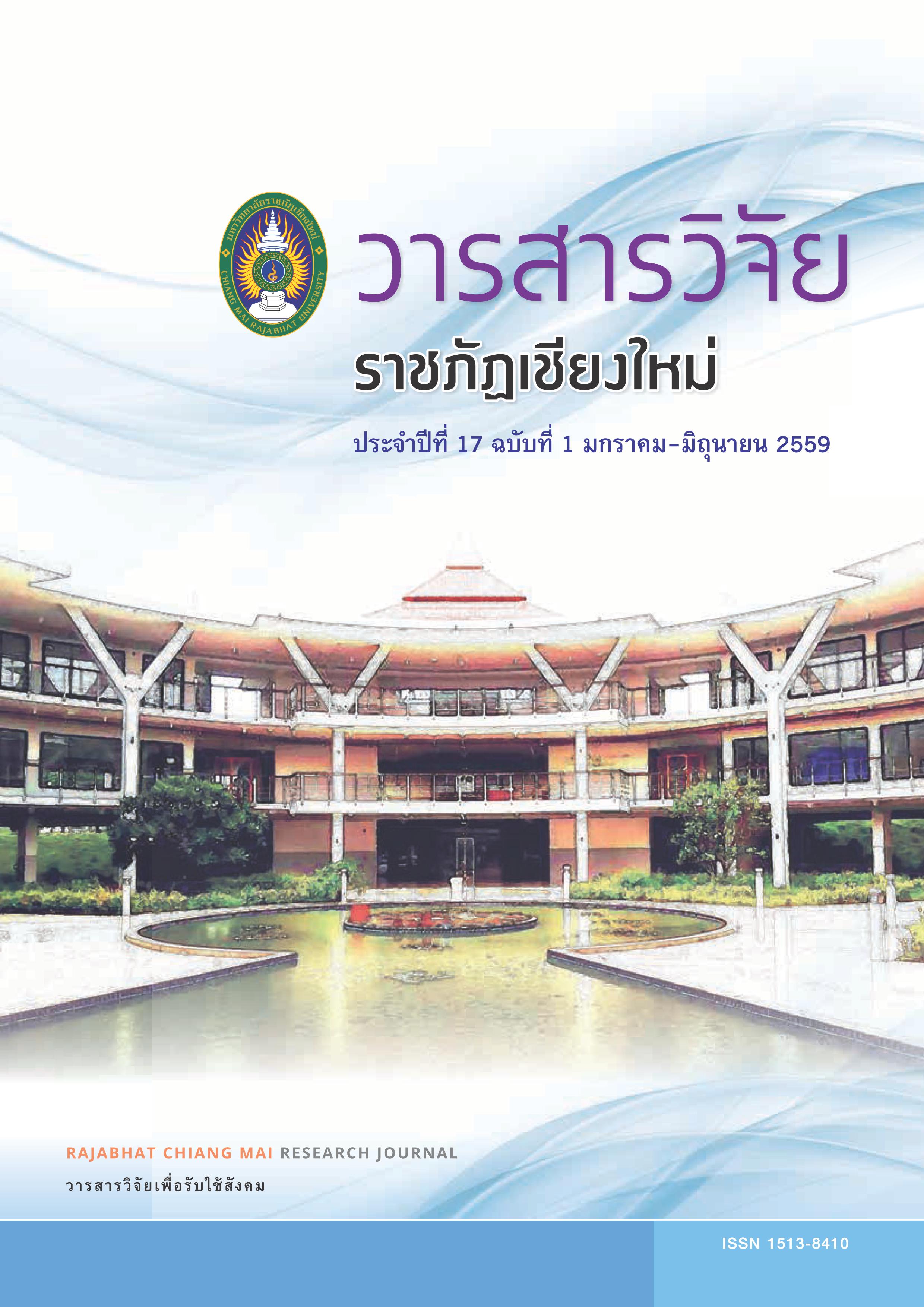The development of Folk Science Lesson plans which concerned for Lanna Local wisdom in the psychotherapy for elderly
DOI:
https://doi.org/10.14456/rcmrj.2016.214848Keywords:
Science Lesson Plans, Health Promotion in the elderly, Lanna Local wisdom in the psychotherapyAbstract
The purpose of this study was to develop and efficiency assessment of Folk Science Lesson plans which concerned for Lanna Local wisdom in the psychotherapy. 297 household, 12 elderly persons and 8 caregivers in the area of Suthep sub - district Municipality, Muang Chiangmai District, Chiangmai Province. Data were collected by using questionnaires, group discussion in-depth interview, and questionnaire before and after the Folk Science Lesson plans were Lanna Local wisdom in the psychotherapy had begun. The Folk Science Lesson plans prepared had efficiency of E1 / E2 according to the set criteria of 80/80, Means, Standard deviation, Paired t-test and content analysis were used for data analysis.
The results indicated that the relationship aspect of Lanna Local wisdom in the psychotherapy was on the highest level (= 2.35). The Folk Science Lesson plans Lanna Local wisdom in the psychotherapy of elderly were 83.18 / 85.25 and caregivers 82.27 / 85.73 .The efficiency gain on each lessons were specified at 80.00 / 80.00 percent (E1 / E2). Comparison of Flok Science Lesson the post – learning achievement score was higher than the pre – learning score (P - value = 0.002, and 0.01).
Downloads
References
ชุติไกร ตันติชัยวนิช. (2551). ความสุขในชีวิตของผู้สูงอายุในจังหวัดระยอง. วิทยานิพนธ์ วิทยาศาสตร มหาบัณฑิต สาขาอนามัยครอบครัว บัณฑิตวิทยาลัย มหาวิทยาลัยมหิดล.
บุญธรรม กิจปรีดาบริสุทธิ์. (2531). ระเบียบวิธีการวิจัยทางสังคมศาสตร์. กรุงเทพฯ: สามเจริญพานิช.
พัทยา นีละภมร. (2550). โครงการฟื้นภูมิปัญญารักษาสุขภาพ. เอกสารอัดสำเนา
มูลนิธิสถาบันวิจัยและพัฒนาผู้สูงอายุไทย. (2555). สารสุขผู้สูงวัย. (ระบบออนไลน์). แหล่งที่มา: http://www.thaitgri.org/ (18 กุมภาพันธ์ 2559)
รศรินทร์ เกรย์ และณัฐจีรา ทองเจริญชูพงศ์ .(2555). ปัจจัยที่ส่งผลต่อสุขภาพจิตของผู้สูงอายุ. วารสารประชากร. 3(2): 45 - 62.
วิชาญ ชูรัตน์ โยธิน แสวงดี และสุพาพร อรุณรักษ์สมบัติ. (2555). ปัจจัยที่มีอิทธิพลต่อภาวะเสี่ยงการมีปัญหาสุขภาพจิตของผู้สูงอายุไทย. วารสารประชากร. 3(2): 87 – 109.
วิทธิลักษณ์ จันทร์ธนสมบัติ .(2552). ทัศนะต่อการเป็นผู้สูงอายุที่มีความสุขของผู้สูงอายุในเขตกรุงเทพมหานคร กรณีศึกษาสาธารณสุข 40 บางแค. วารสารพฤฒาวิทยาและเวชศาสตร์ผู้สูงอายุ. 9(2): 47 - 54.
สถาบันวิจัยสังคม. (ม.ป.ป.). นโยบายของรัฐ และแนวทางการจัดบริการสังคมสำหรับผู้สูงอายุในอนาคต. (ระบบออนไลน์). แหล่งข้อมูล: http://www.sri.cmu.ac.th/~srilocal/research_a/DATA/39_B.html (2 มีนาคม 2559).
สามารถ ใจเตี้ย และดารารัตน์ จำเกิด. (2555). พฤติกรรมการสร้างเสริมสุขภาพของผู้สูงอายุในเขตเมือง. ราชภัฏเพชรบูรณ์สาร. 14(2): 107 -112.
สามารถ ใจเตี้ย สิวลี รัตนปัญญา และสมชาย แสนวงศ์. (2555). ประสิทธิภาพของบทเรียนวิทยาศาสตร์ท้องถิ่น เรื่อง ภูมิปัญญาพื้นบ้านล้านนากับการสร้างเสริมสุขภาพผู้ติดเชื้อและเอดส์ : สมุนไพรและโภชนาการบำบัด. วารสารวิจัยราชภัฏเชียงใหม่. 14 (1): 57 – 64.
Anderson, L.W. (1988). Likert Scales, Education Research Methodology and Measurement : An International Handbook. John, D. Keeves, eds, Victoria: Pergamon.
George, L.K. (2010). Still happ after all theseyears: research frontiers on subjective well-being in later Life. Gerontology: Social Sciences. 65B(3): 229 – 331.
Downloads
Published
How to Cite
Issue
Section
License
1. Articles, information, content, images, etc published in the “Community and Social Development Journal” are copyrighted by the Community and Social Development Journal, Chiang Mai Rajabhat University. In order to properly distribute the articles through print and electronic media, the authors still hold the copyright for the published articles under the Creative Commons Attribution (CC BY) license, which allows the re-distribution of the articles in other sources. References must be made to the articles in the journal. The authors are responsible for requesting permission to reproduce copyrighted content from other sources.
2. The content of the articles appearing in the journal is the direct responsibility of the article authors. The editorial board of the journal does not necessarily agree with or share any responsibility.














